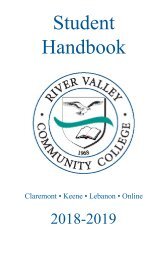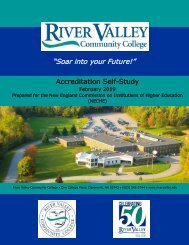You also want an ePaper? Increase the reach of your titles
YUMPU automatically turns print PDFs into web optimized ePapers that Google loves.
course outline includes a grading scale and the Department Chair is responsible for<br />
coordinating the use of the same textbook. There is flexibility in how faculty meet the<br />
required outcomes identified in the course outline and each course must have a syllabus<br />
which identifies how the individual faculty member will run their course. Faculty are also<br />
protected by Academic Freedom policies in the CBA which allow for flexibility and<br />
personalization of each class offered.<br />
Academic Advising<br />
Throughout the three <strong>RVCC</strong> academic locations there are 1.5 Academic Advisors dedicated<br />
to advising General Studies students, which includes students who are undecided, and<br />
non-matriculated students; and one part-time advisor dedicated to Liberal Arts students.<br />
Program Directors and Department Chairs are also responsible for academic advising<br />
according to the program maps which have been created for each major at the College.<br />
Students are assigned an advisor upon acceptance to the College and they are provided<br />
with their advisor’s name and contact information in their acceptance letter. Each<br />
semester there are set Academic Advising Weeks which coincide with the distribution of<br />
the schedule for the following semester. Prior to the Academic Advising Week, fliers are<br />
posted throughout the College and emails are sent out from the Students Success Centers<br />
as well as directly from advisors to ensure that students are aware of upcoming advising<br />
and registration dates. All advisors have access to the advising manual which was<br />
updated in 2018 as well as access to the program maps via Canvas. Academic Advising is<br />
assessed as part of the Graduate Satisfaction Survey provided to graduating seniors.<br />
Scholarship & Research<br />
There are CCSNH policies that support scholarship, research and creative activities. The<br />
full-time faculty contract states up to 5% of full-time faculty’s job can be used for<br />
professional growth and development (Article X). This allowance is most frequently used<br />
by faculty in the Allied Health and Health Science programs. Two of the three Physical<br />
Therapist Assistant faculty, both of the Occupational Therapy Assistant faculty, and all<br />
faculty (full-time and adjunct) in the Massage Therapy program take time during the<br />
school year for clinical practice. Faculty also use this time to pursue advanced degrees.<br />
Recently, the Computer Technology faculty member earned his Master’s degree, the Math<br />
faculty member is in the process of earning his Doctoral Degree, and both OTA faculty<br />
members are enrolled in graduate programs (one Doctoral and one Master’s). The<br />
contract also outlines the policy that allows a faculty member to request either a paid or<br />
unpaid educational leave (Article XXV). The adjunct faculty contract does not include<br />
release time for professional growth and development nor for educational leaves (but does<br />
cover leaves for temporary disability, military service and civil duty).<br />
90 | P a g e





